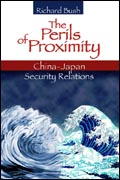China’s defense ministry announced a new “East China Sea Air Defense Identification Zone” that covers the airspace of uninhabited islands—called Diaoyu by the Chinese and Senkaku by the Japanese— in dispute with Japan, a move a Japanese official told the Chinese ambassador was “totally unacceptable.”
In August, Richard Bush, director of the Center for East Asia Policy Studies, delivered the keynote speech at the 2013 East China Sea Peace Forum in Taiwan in which he explored this and other complex maritime disputes and suggested a path forward in resolving them. “First of all,” Bush said,
the clash among countries in the maritime domain of East Asia is a manifestation of underlying geopolitical rivalry in the region, a rivalry that usually pits China against other parties in a zero-sum competition. This contest is not the only way in which nations in the region interact with each other. They also seek to deepen economic cooperation for the benefit of all. But rivalry occurs simultaneously, and maritime disputes contribute to it. If maritime disputes are not addressed and mitigated, they will reinforce rivalry, to the detriment of all. Second, these maritime disputes actually encompass disagreements on several interrelated policy questions at the same time, and these disagreements are cumulative in their effect. That means, and this is my third point, that if the parties concerned wish to mitigate disputes and so enhance regional peace and stability, they must reduce or resolve the differences in the right sequence.
 During the speech, he called attention to an incident in September 2010 when a Chinese fishing trawler rammed Japanese Coast Guard vessels near the disputed islands in the East China Sea. In a prescient coincidence of timing, a month later, Brookings published Bush’s The Perils of Proximity: China-Japan Security Relations. He also wrote a Brookings policy brief on the subject. At the same time, Sun-won Park wrote a paper in which he said that the outcome of the 2010 dispute was a short-term victory for China but a long-term loss as well.
During the speech, he called attention to an incident in September 2010 when a Chinese fishing trawler rammed Japanese Coast Guard vessels near the disputed islands in the East China Sea. In a prescient coincidence of timing, a month later, Brookings published Bush’s The Perils of Proximity: China-Japan Security Relations. He also wrote a Brookings policy brief on the subject. At the same time, Sun-won Park wrote a paper in which he said that the outcome of the 2010 dispute was a short-term victory for China but a long-term loss as well.
In January, as part of the Big Bets/Black Swans presidential memorandum briefing book, Bush, Bruce Jones and Jonathan Pollack advised President Obama on this potential “black swan”:
You have the opportunity to mitigate the danger of future physical clashes by mounting a concerted diplomatic effort to encourage the countries concerned jointly to adopt conflict-avoidance mechanisms in the near term and to promote more institutionalized risk-reduction measures in the medium term. This will both serve U.S. interests in avoiding unnecessary entrapment and foster an environment conducive to cooperative exploitation of resources.
This could be pursued both at the regional and international levels. During the Cold War, the United States concluded risk-reduction agreements with the Soviet Union to regulate the interactions of its naval ships and air force planes. There has been recent work by the United Arab Emirates, Australia and India to foster better exchange of lessons, build private and public sector capacity, and share information about crisis-mitigation tools at the international level; diplomatic efforts to build on this could provide useful context to regional efforts and minimize a sense that China is being singled out.
In 2009, Bush also reviewed the history of China-Japan tensions between 1995 and 2006.
Get more research & commentary from the Center for East Asia Policy Studies and also the Asia and the Pacific research topic page.


Commentary
China Extends Air Defense over Diaoyu/Senkaku Islands in East China Sea Dispute with Japan
November 23, 2013